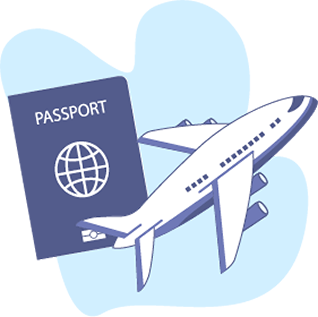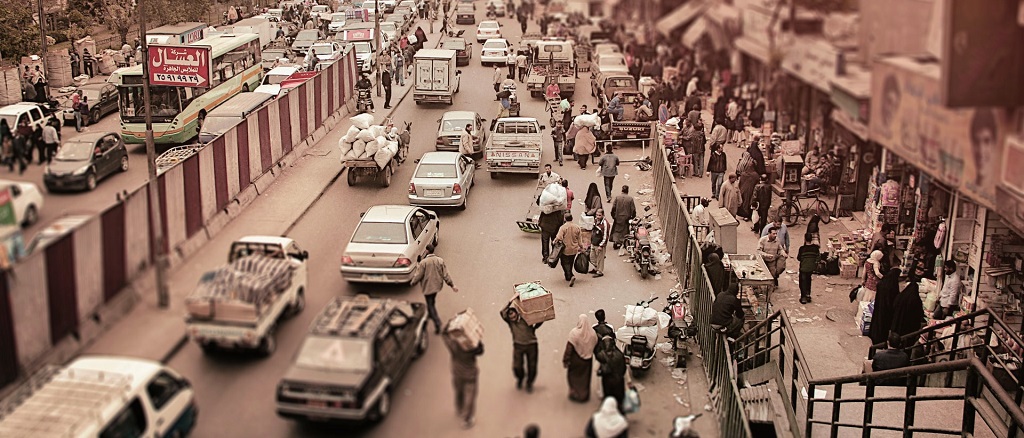Driving in Egypt is not for the faint of heart. If the thought of driving 8 cars across with no lanes, constantly battling to claim the right of way, and swerving around pedestrians, animals and 4-member families perched atop motorcycles as they weave in and out of traffic gives you pause, you may want to reconsider getting behind the wheel in this country.
Whether you’re up for the challenge and want to know more about driving a car in Egypt or you’re looking to explore alternative ways to get around, this guide will help you out. Learn the rules of the road (both written and unwritten), what to expect, what to look out for, road safety tips and the possibility of hiring others to do the driving for you.


Contents
Official Driving Rules in Egypt – On the Books
- Drive on the right-hand side of the road.
- Respect road signs.
- Wear your seatbelt (mandatory for the driver and front-seat passengers).
- Children under the age of 7 must sit in the back.
- Using a mobile phone is prohibited unless you have a hands-free system.
- The legal blood alcohol limit is .05%.
- You must be at least 18 years old to drive and at least 25 to rent a car.
- For car rental, foreigners need an International Driver’s Permit (IDP) plus your regular driver’s license and your passport.
- You must carry a first aid kit in the car, as well as your driver’s license and IDP, vehicle registration documents and insurance documents. It’s also a good idea to keep a copy of your Egypt visa with you.
- The standard speed limit on inner-city or urban roads is 60 km/h, while on the outskirts and rural roads it is usually 90 km/h and up to 100 km/h on major highways. Pay attention to the signage on the road.
- Petrol stations are open from 8 am to 8 pm. They can be far and few between outside cities, so it may be a good idea to fill up your tank when you get the chance.
- Some roads and areas of the country are off-limits to tourists or require a special permit, so check your complete route before starting your journey. This includes much of the Sinai Peninsula as well as areas near the borders with Libya, Sudan and Israel.
- Foreigners are strongly encouraged to avoid driving at night.
Realities of Egypt Traffic – What to Expect
- Traffic rules are routinely ignored by Egyptian drivers.
- It is not uncommon for cars to drive the wrong way, even on motorways, exit ramps and one-way streets.
- The idea of who has the right of way is in constant flux. Other drivers will be constantly fighting to get ahead of you, as will pedestrians, stray animals, etc.
- There are no fixed lanes. Even if lanes are marked on the road, drivers will ignore them and create their own. Do not expect to drive in a straight line.
- Do not expect other drivers to use indicators or other signals, and if they do, do not trust them to do as the signals suggest.
- Drivers often stop suddenly, make unexpected turns (including U-turns!), drive sideways across traffic, and otherwise act unpredictably.
- Many vehicles, including buses and lorries, do not use headlights at night. This makes night driving even more dangerous.
- Egypt has one of the world’s highest rates of road fatalities per kilometre driven.
Driving in Cairo – Expect the Unexpected!
If you like chaos, you will love driving in Cairo. Trying to manoeuvre your way from point A to point B in the capital city is an action-packed adventure with infinite surprises. Or an unrelenting nightmare with danger lurking around every turn. It all depends on your point of view!
Here are some tips to keep in mind if you choose to drive in Cairo:
- As mentioned above, drivers often act in ways you cannot predict, including turning or completely stopping out of the blue, driving the wrong way, creating their own lanes, and generally ignoring regulations.
- Stay alert at all times when on the road in Cairo. You will need to adapt to an ever-changing panorama of other cars, lorries, buses, microbuses, motorcycles, cyclists, pedestrians, and animals. Do not expect any of them to comply with the concepts you learnt at driving school.
- Traffic lights are mostly absent, and the few that do exist are often out of order. There may be police officers at major intersections to help direct the flow of traffic. If you do happen to encounter a working traffic light, do not assume that Egyptian drivers will pay any attention to it.
- Traffic jams occur around the clock, but it’s best to avoid rush hours (usually 8 to 9 am and 4 to 6 pm) whenever possible to steer clear of the worst Cairo traffic conditions.
- Don’t let the constant beeping and honking get to you!
- If you find a place to park, it is common for someone to appear and demand a tip to allow you to park there and protect your vehicle.
You can expect similar conditions when driving in Alexandria or other large cities in Egypt.
Car Rental in Egypt
Are you a brave soul ready to hit the road and stay permanently on the edge of your seat? You may be wondering where you can hire a rental car in Cairo and other parts of the country.
Several international car rental companies operate in Egypt, including:
- Avis
- Budget
- Europcar
- Sixt
You can find them at airports as well as in the following major cities and tourist destinations:
- Alexandria
- Cairo
- Giza
- Hurghada
- Ismailiyah
- Luxor
- Marsa Alam
- Sharm el-Sheikh
Due to the many hazards of driving in this country, getting a comprehensive insurance policy is highly recommended.
Driving Alternatives in Egypt
Thinking twice about driving yourself around? That’s probably smart. Most people recommend that tourists in Egypt don’t take driving into their own hands.
Taxis in Egypt
Egypt has some of the cheapest taxi fares in the world. However, drivers do sometimes try to take advantage of tourists. To avoid getting duped, ask at your hotel reception what the approximate cost of the taxi fare should be for different trips, depending on how far you are travelling.
In addition to the local taxis, which vary depending on where you are in the country, there are also a number of app-based taxi services. Uber Taxi in Egypt currently operates in Cairo and Alexandria. Other companies include London Cab, Easy Taxi and Careem. There is also a Pink Taxi company in Egypt with all female drivers and riding services that are for women only.
Be careful and stay alert when using taxis. The Australian government, for example, recommends that travellers avoid using taxis, especially women travelling alone. While government recommendations can sometimes be overly cautious, it is important to be aware of the risks when making transport decisions.
Hiring a Car and Driver
Depending on your plans, hiring a private car and driver may be your best bet for getting around. Talk to your hotel and they are sure to recommend a variety of reliable options. You may want to compare rates based on the route or number of hours with half-day and full-day prices.
Frequently Asked Questions
Can Women Drive in Egypt?
Yes, women can drive private and rented cars in this country. There are no legal restrictions on female drivers.
What Kind of License Do You Need to Drive in Egypt?
As a foreigner, you will need a domestic driving license from your country of residence as well as an International Driving Permit (this is sometimes incorrectly referred to as an international driving license). If you stay in the country for more than 6 months (or whenever your IDP expires), you will need to get an Egyptian driver’s license.
Are There Many Traffic Accidents in This Country?
Yes, there are many accidents on the road. The World Health Organisation report states that road traffic crashes in Egypt result in around 12,000 deaths each year. Always wear your seat belt and use extreme caution when driving, getting into and out of vehicles, and crossing the street as a pedestrian. While you may be following the rules, many drivers do not.
The Bottom Line
For most travellers, it is best to avoid driving in this country. Luckily, there are affordable transport alternatives available. If you do decide to drive on your Egyptian holiday, make sure you are aware of the risks, avoid driving at night, use extreme caution and keep your eyes glued to the road.

